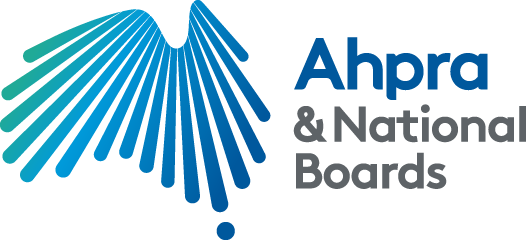When should I apply?
We recommend getting your application in early, up to three months before the time you expect to complete all your course requirements, which includes any placements.
You don’t need to wait until you’ve completed your course or graduated, to apply.
If you’ve already completed your course, you can apply now.
Pharmacy and psychology graduates have additional requirements and should apply once your supervised practice arrangements are signed off.
How do I create an account?
After selecting the 'Start application' button you will be taken to the account sign up screen to create your secure online portal account.
Which email should I use?
- Use an email address that is unique to you.
- Don’t use an email address that is shared with or accessible by anyone else.
- Avoid using your education provider email as you may not be able to access it after you graduate.
We will also use this email address to contact you if we need more information.
What information do I need to provide?
When you apply, you need to demonstrate that you meet the requirements for registration (registration standards), provide sufficient evidence of your identity and pay the relevant fee.
As well as the completed application form, your application must include:
- the relevant fee
- certified copies of your proof of identity
- all other required information such as evidence to support your English language declaration, relevant information about your criminal history, or evidence from your treating practitioner about any health impairments.
It’s important that you provide as much information as you can when you submit your application because assessment of your application may be delayed if we need to contact you for further information.
The online application form will provide you with a list of documents that you will need to scan then upload before you can submit your application.
English language skills
The National Boards have set requirements for English language skills (ELS) to make sure your skills enable you to communicate effectively with patients/clients/consumers and their relatives and carers, collaborate with other colleagues and keep clear and accurate health records.
You must meet the ELS registration standard for your profession, regardless of whether you are Australian-trained or qualified overseas. It is one of the five core registration standards and is required by every National Board.
In the common ELS registration standard (for 13 professions except Aboriginal and Torres Strait Islander health practice, nursing and midwifery), there are four pathways that you can use to demonstrate that you are competent in the English language and meet the English language skills standard. The pathways are:
- the combined education pathway
- the school education pathway
- the advanced education pathway, and
- the test pathway.
For more information on National Boards’ ELS requirements, please visit the English language skills webpage.
If you are applying for registration with the Nursing and Midwifery Board of Australia, you must meet their ELS registration standard.
For graduates applying to be an Aboriginal and/or Torres Strait Islander Health Practitioner, your English language proficiency can be demonstrated through the completion of the Certificate IV in Aboriginal and/or Torres Strait Islander Primary Health Care (Practice) or a qualification considered by the Aboriginal and Torres Strait Islander Health Practice Board of Australia to be equivalent. More information is available on the Board's website.
Health impairments
When we say ‘health impairment’ we mean any serious physical or mental impairment, disability, condition or disorder (including substance abuse or dependence) which could negatively affect your ability to practise.
It doesn't mean you'll be prevented from practising but we need to know what you are doing to manage your health.
We may require current documentation about your diagnosis and/or treatment plan and a statement regarding your current fitness to practise from your treating health practitioner.
It's important that you provide as much information as you can about your health issues when you submit your application. Assessment of your application may be delayed if we have to contact you for further information.
Criminal history
In your application, you need to tell us about any criminal history.
Criminal history includes every:
- conviction for an offence
- plea of guilty or finding of guilt by a court for an offence, whether or not a conviction is recorded for the offence
- every charge for an offence, even those resolved without a conviction or finding of guilt.
Your National Board will decide whether your criminal history is relevant to the practise of the profession. For further information on the factors the Board will consider in making this decision, see the Criminal history registration standard.
We cannot register you until we have received the results of your criminal history check/s.
Australian criminal history check
We conduct an Australian criminal history check on every applicant. This cost is covered in your application fee.
You need to supply a complete criminal history with your application irrespective of the time that has lapsed since the charge was laid or the finding of guilt was made. This is because under the National Law, spent convictions legislation does not apply to criminal history disclosure requirements.
If you do not supply your full criminal history, your application may be delayed or refused.
International criminal history check
If you have lived overseas for a period of six consecutive months or more as an adult you will also need to complete an international criminal history check. It is your responsibility to request and pay for your international criminal history check through an Ahpra-approved supplier. The results will be passed to us directly.
How do I certify my photographic proof of identity documents?
It’s important that you get your photographic proof of identity documents certified correctly.
On documents with a photograph, such as your passport or driver’s licence, you must make sure the authorised officer writes or stamps:
‘I certify that this is a true copy of the original and the photograph is a true likeness of the person presenting the document as sighted by me.’
To make sure your documents are certified correctly, please download or print the guide ‘Certifying documents’ and take it with you to get your documents certified.
- Certifying documents guide (463KB, PDF)
The guide provides a full list of authorised officers who can certify your documents this includes any Australian registered health professional.
Please note: in NSW only, justice of the peace cannot certify a true likeness. Applicants from NSW must get their photo ID documents certified by another authorised officer from the list.
How do I upload documents?
Once you have created an account, all documents can be uploaded on the online portal
All documents must:
- be clear and legible
- less than 10MB, and
- in one of the following formats: .JPG, .JPEG, .GIF, .PNG, .PDF, .TIF, .TIFF.
How long does it take to assess my application?
Once we’ve received your graduate results from your education provider, we aim to finalise your application within two weeks. That’s if we have a complete application, meaning we have everything we need to make our assessment.
It may take longer to assess your application if:
- your photo ID documents are not correctly certified
- you have not provided all the information required
- you have indicated you have a health impairment that requires more detailed assessment
- you do not declare your criminal history, or
- there is a delay in receiving the results of international criminal history checks from an Ahpra-approved supplier.
A few education providers submit graduate results in late October with the majority sending through their graduate results in late November to mid-December.
While we can’t finalise your application until after we’ve received your graduate results, we begin to assess your application beforehand so that it’s ready to go pending your results. That’s why we encourage you to submit your application early and to check whether you’ve provided everything you need to prove that you’ve met the requirements for registration. This is particularly important during the end-of-year peak graduate period where we receive about 37,000 applications within a few months.

